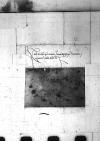Letter #5727
Sigismund I Jagiellon to Ioannes DANTISCUSCracow (Kraków), 1546-04-29
| received Wormditt (Orneta), 1546-05-06 Manuscript sources:
Auxiliary sources:
| ||||||||||
Text & apparatus & commentary Plain text Text & commentary Text & apparatus
Reverendo in Christo Patri, domino
Reverende in Christo Pater, domine sincere nobis dilecte.
Litteras Paternitatis Vestrae accepimus, quibus nostris respondet. De
Bene valeat Paternitas Vestra.
Dat(ae) or Dat(um)⌈Dat(ae)Dat(ae) or Dat(um)⌉
Ex mandato s(acrae) or s(erenissimae)⌈s(acrae)s(acrae) or s(erenissimae)⌉ regiae maiestatis proprio


 BNW, BOZ, 953, f. 261v
BNW, BOZ, 953, f. 261v